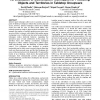Free Online Productivity Tools
i2Speak
i2Symbol
i2OCR
iTex2Img
iWeb2Print
iWeb2Shot
i2Type
iPdf2Split
iPdf2Merge
i2Bopomofo
i2Arabic
i2Style
i2Image
i2PDF
iLatex2Rtf
Sci2ools
111
click to vote
CHI
2009
ACM
2009
ACM
An evaluation of coordination techniques for protecting objects and territories in tabletop groupware
Indirect input techniques allow users to quickly access all parts of tabletop workspaces without the need for physical access; however, indirect techniques restrict the available social cues that are seen on direct touch tables. This reduced awareness results in impoverished coordination; for example, the number of conflicts might increase since users are more likely to interact with objects that another person is planning to use. Conflicts may also arise because indirect techniques reduce territorial behavior, expanding the interaction space of each collaborator. In this paper, we introduce three new tabletop coordination techniques designed to reduce conflicts arising from indirect input, while still allowing users the flexibility of distant object control. Two techniques were designed to promote territoriality and to allow users to protect objects when they work near their personal areas, and the third technique lets users set their protection levels dynamically. We present the res...
CHI 2009 | Human Computer Interaction | Indirect Input Techniques | Indirect Techniques | Tabletop Coordination Techniques |
| Added | 24 Nov 2009 |
| Updated | 24 Nov 2009 |
| Type | Conference |
| Year | 2009 |
| Where | CHI |
| Authors | David Pinelle, Mutasem Barjawi, Miguel A. Nacenta, Regan L. Mandryk |
Comments (0)

